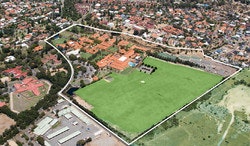Year 8 Japanese
Overview
The study of Japanese in Year 8 is like a journey to a new location where different stories, songs, sports, games and even food exists. Students start this journey with first encounters and soon learn the conventions and language of greetings, gift giving and early business transactions. Students will read and write hiragana and be able to use their skill in Japanese for computer and iPad based activities. All learning is done with interactive songs, games, cards and colour.
By the end of Year 8 Japanese students will have developed their ability to communicate in Japanese and examine, understand and compare their own culture to that of the Japanese people. The students will examine similarities and differences between Australia and Japan within contexts such as the home, school, sports, hobbies and traditional customs.
Topics
The students will learn how to exchange information and develop their cultural understand in these broad contexts:
- The Individual - Exchanging Information about Me, My Family, Hobbies, Interests and Sport
- Japanese Speaking Communities - Home Life and Leisure
- The Changing World - Going Places, The Influence of Technology on Learning
They will also be introduced to the Japanese scripts: hiragana, katakana and some kanji.
Assessments
The student's achievements are assessed generally at the end of the topic. These assessments may vary in time but usually will take up to a lesson (50 minutes) to complete. Topics may last a term or longer and assessments are carried out according to the Outcomes below.
Outcome One: Listening and Responding
Outcome Two: Spoken Interaction
Outcome Three: Viewing, Reading and Responding
Outcome Four: Writing
Cultural Understandings, Systems of the Japanese Language and Language Learning Strategies will be embedded in the course and assessments.
Reporting
Students will receive a grade upon the completion of the course:
A Excellent: The student demonstrates achievement that has greatly exceeded the expected standard. Their achievement is well beyond what is expected at this year level.
B Good: The student demonstrates achievement that exceeds the expected standard.
C Satisfactory: The student demonstrates achievement at the expected standard. The student is able to progress to the next level of learning.
D Limited: The student demonstrates achievement below the expected standard. The student demonstrates a quality of learning that is adequate for progression but will still need additional support or assistance to progress.
E Very Low: The student demonstrates achievement below the minimum acceptable for this year level.
Student expectations
Focus on developing skills in listening and speaking, reading, viewing and responding and writing. Employ a variety of ways to learn a language such as:
- Review work covered in class
- Learning new words, expressions and grammatical structures
- Complete reading and writing tasks commenced in class
- Research, develop dictionary skills
- Practise speaking, dialogues, skits
- Revise for tests, using a range of strategies
- Note errors and practice re-writing accurately
- Practise reading and writing characters in Japanese
- Use apps and software to practise vocabulary and script
